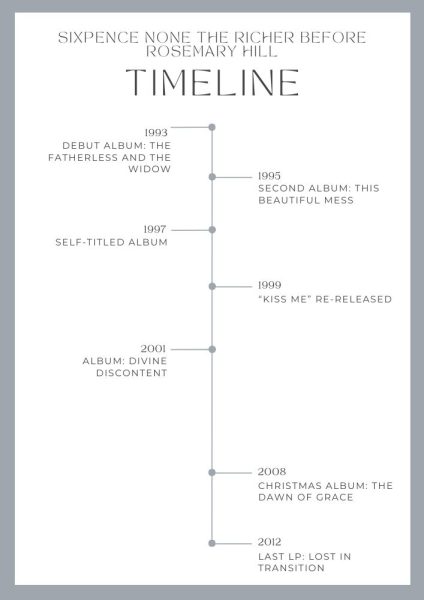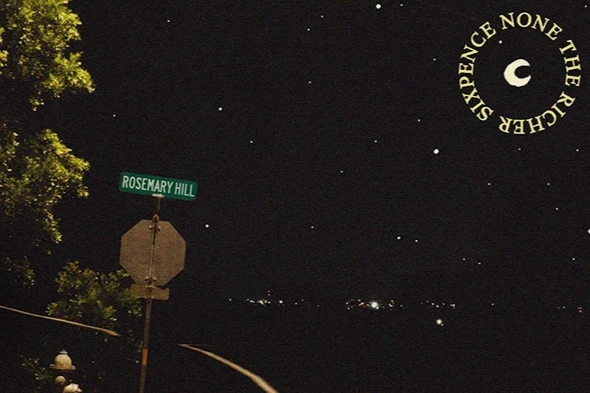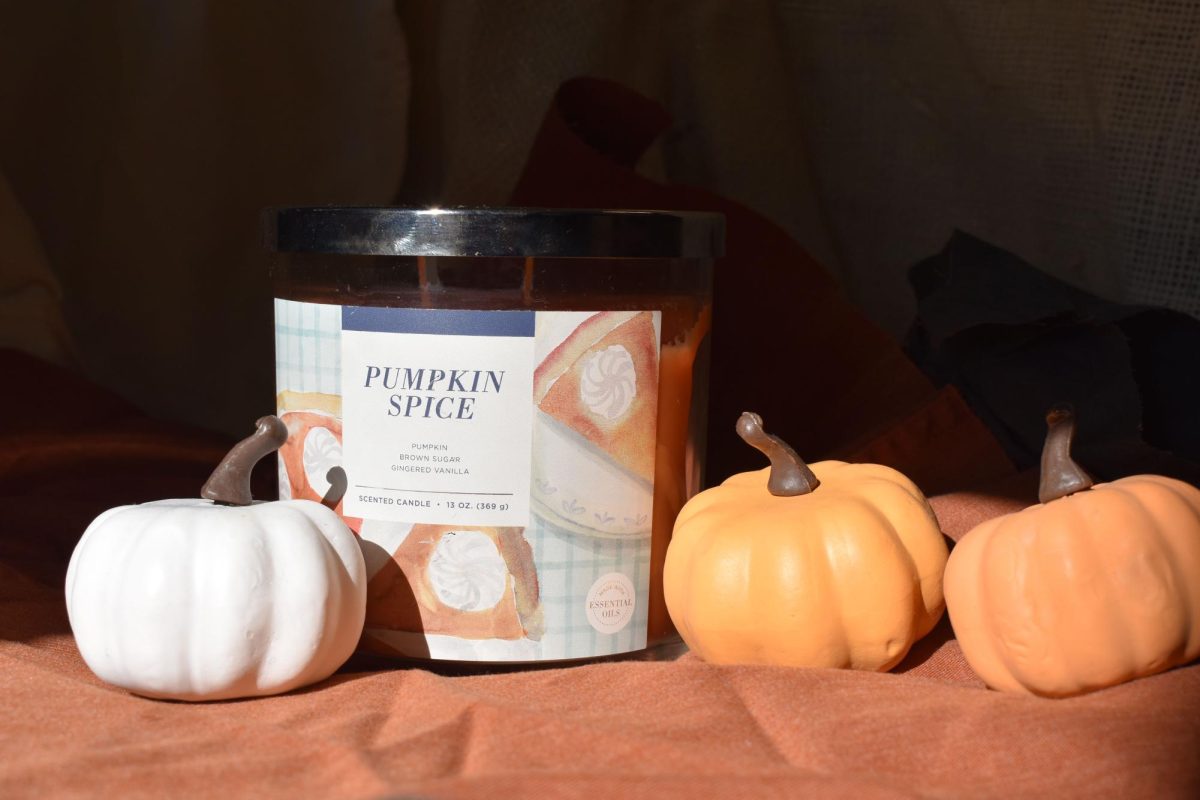When guitarist and lyricist Matt Slocum, singer Leigh Nash, drummer Dale Baker and bassist Justin Cary named their Christian alt-rock band after a C.S. Lewis theological treatise, it would have been hard to envision what Sixpence None the Richer would turn into. In fact, it was hard to tell what Sixpence would turn into when they released their first album with Squint Entertainment in 1997, which was their self-titled third album. And it was still hard to tell that they’d become a phenomenon until two years after that release, when their re-released single “Kiss Me” raced to the top of the charts after landing in the hit movie “She’s All That.” The group returned to the charts twice over the next few years before disbanding in 2004. Now, they’ve returned, with a new tour and a fresh EP. Sixpence will hold a concert at City Winery in St. Louis on Oct. 26. To prepare, brush up with this rundown of “Rosemary Hill.”
The opener: “Thread the Needle”
Nash and Slocum both put their talent on full display, as her bubbly voice and his jangly guitar give “Thread the Needle” a skip in its step. However, even at a modest four minutes, this song seems to drag on for a while; the simple chorus gets old quickly. “Thread the Needle” doesn’t have the thoughtful, intricate lyricism that Sixpence have been known for in the past, and its similarity to “The Bandit” by Kings of Leon makes it feel somewhat like generic alt-rock. Still, it’s a fun and impressive first track that will have listeners excited to hear the rest of the album.
Should have been the lead single: “Julia”
Warmth exudes from Nash’s voice in the verses of “Julia,” which build into an earworm of a chorus that will travel with you all week. You can tell Nash is a veteran of the music business by her ability to alter her melody in unexpected ways based on what she’s singing about — the way she emphasizes the fact that Julia’s mom has another new boyfriend alters the meaning. The song was written by Nash, which may contribute to her ability to sing it with such passion and intricacy. Baker and the guitarists largely fill in behind instead of stealing the show, which works well; Nash’s vocals are more than sufficient to carry the song. The result is a sultry yet upbeat tune, one of the EP’s strongest.
Was the lead single: “We Are Love”
I really struggle to understand the point of this song. It’s not Slocum’s finest moment lyrically; he tries way too hard to have Nash sound mysterious. Listeners are forced to pay attention to Nash’s performance, which was a good thing on “Julia;” here, it’s either mildly painful or painfully boring. The venture would have benefited if the volume had been turned up on the on the guitars. It’s not all bad; Slocum has some fun riffs and Baker is solid on drums. There is a good song hidden somewhere in here. On “We Are Love,” Sixpence didn’t find it.
Coming into their own: “Child and Man”
This is the Slocum I was waiting to hear all album. His guitar both complements and stands out against Nash’s voice, while the ephemeral lyrics seem interesting and meaningful rather than contrived and incomprehensible. It’s not clear what type of relationship Slocum is having Nash sing about here, and there might not be one answer, but you can tell their hearts are in it. The result is a peaceful, beautiful examination of how broken people can bond with and love each other. If “We Are Love” puts listeners to sleep, at least “Child and Man” comes after to ensure sweet dreams.
Nostalgia bomb: “Homeland”
On “Homeland,” Sixpence memorializes the town of their founding: New Braunfels, Texas. Slocum remains committed to the sounds of 2000s alt-rock, and its familiar sounds work well here. Nash’s voice swoops and sways; like Bono on “In A Little While,” she can fill her melody with a yearning for times past. When she sings Slocum’s words about how being back in their childhood home gives them chills, listeners get chills as well. “Homeland” goes down easy — it doesn’t do anything we haven’t seen before, but it doesn’t need to to be a fun, nostalgic remembrance of a Texan upbringing.
Where the streets have names: “Rosemary Hill”
Slocum grew up on a street called Rosemary Hill and named this song after it, so it must have been difficult for him to take a backseat here to the violin of session artist David Davidson. It’s a good thing he did, though, because Davidson’s playing complements Nash’s wistful voice beautifully. Slocum doesn’t totally fade into the background, adding some good licks to fill out the song. “Rosemary Hill” is full of anecdotes of quintessential small-town experiences and appreciation for a place that formed Nash and Slocum.
Sixpence were away for too long, but they clearly haven’t lost a step. The group didn’t try to hit a home run, and they didn’t have to. With Nash and Slocum elevating the music, it was enough to get on base. For a saccharine delight that will endear itself to old fans and new listeners alike, the Pathfinder rates “Rosemary Hill” a 7.8/10.





![There are more than 20 open cardio machines at Crunch Fitness. I enjoyed the spacious environment at Crunch, a sentiment that was shared by sophomore Sanjana Daggubati. “[Going to] Crunch Fitness was the right decision because [it] feels more professional. Crunch’s workers are laid back, but not to the point where they don't care,” Daggubati said.](https://pwestpathfinder.com/wp-content/uploads/2025/09/IMG_5242-1-1200x900.jpg)

![Various empty Kit Kat wrappers crowd the desk, surrounded by scoring sheets. While production of Kit Kat flavors in the U.S. is limited, Nestlé, the owner of Kit Kat, manufactures hundreds of unique flavors in Japan, including the flavors ocean salt and passion fruit. “I thought there [were] some interesting flavors, and a lot of them were really unexpected,” senior Elle Levesque said.](https://pwestpathfinder.com/wp-content/uploads/2025/09/image-2.png)


![Pantone’s selection of the 2025 Color of the Year is revealed: Mocha Mousse. Ceramics teacher Ashley Drissell enjoys this year’s selection. “Maybe it’s the name but [Mocha Mousse] reminds me of chocolate and coffee. It makes me hungry. It’s very rich and decadent,” Drissell said.](https://pwestpathfinder.com/wp-content/uploads/2025/02/DSC_0015-1200x800.jpg)



